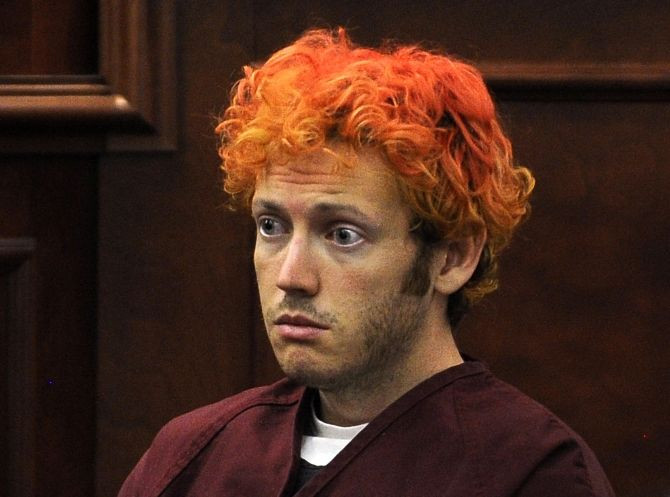James Holmes To Wear Hidden Harness In Aurora Massacre Trial; How Defendants’ Physical Appearance Can Influence Jurors

In his pre-trial court appearances, Aurora, Co. shooting suspect James Holmes has consistently worn prison-issued attire and shackles on his hands and feet. His lawyers asked for Holmes to be unshackled when his trial begins in February, saying that the restraints could influence the jury's decision. But is a defendant's wardrobe really a factor in verdicts?
Holmes is accused of opening fire at an opening night showing of The Dark Knight Rises, a Batman movie, on July 20th last year. Twelve movigoers were killed in the incident. Seventy were injured.
Judge Carlos A. Samour, Jr. ruled Thursday that Holmes will be bolted to the floor and restrained via hidden harness during his trial, seemingly agreeing with defense lawyers about the possibility that the shackles could influence jurors. The judge also erred on the side of caution, though, in light of the gruesome nature of Holmes' alleged crimes. "Given the multiple violent charges in this case, public safety requires that the defendant must remain restrained during trial," Samour wrote in his order.
With increased security in tow, Holmes will be allowed to wear street clothes and a harness mechanism that will not be visible to the jury.
It's no secret that defense attorneys pay a great deal of attention to their clients' appearance under the belief that jurors can be swayed one way or another based on the defendant's physical appearance. Scientific evidence may actually affirm that belief.
Person Perception in Social Psychology
"Person perception" is a social psychological term that refers to the mental processes we use to form impressions of other people. Person perception can be influenced by everything from personal experiences to social norms. Physical cues (i.e. the way one is dressed) play a big role in person perception.
Part of the way we perceive one another is achieved by compartmentalizing certain physical and personality traits and assigning them to a "type" of person. This process of compartmentalization is called social categorization. The problem with social categorization arises when it leads to people forming uninformed generalization.
Defense attorneys try to do all that they can to avoid their clients being placed in jurors' social categorizations by changing defendants' appearance to look more closely like what most would consider the social norm. Dressing in a prison uniform, for instance, could bring about negative associations that most people place on criminals. However, putting on a suit can have the effect of the defendant garnering a certain amount of subconscious respect from jurors.
The "Nerd Defense"
One technique that defense attorneys have used time and time again is the "nerd defense" — a term that refers to the act of placing glasses on defendants in hopes that jurors will perceive them as less menacing.
A study of the personality traits people attribute to people who wear glasses found that participants rated individuals wearing glasses as more intelligent, dependable, industrious and honest. In 2008, a study found that defendants in a mock trial who wore glasses received fewer guilty verdicts than those who did not. "Using path analysis, we found that eyeglasses had a significant indirect effect on verdict by increasing ratings of intelligence, which in turn was related to not guilty verdicts. Defendants who wore eyeglasses were also rated as less physically threatening," the study found.
"I've tried cases where there's been a tremendous amount of evidence, but my client wore glasses, dressed well and got acquitted," said attorney Harvey Slovey. Slovey coaches clients on what to wear in court.
"If a jury thinks the defendant looks incapable of a brutal crime, then it's certainly an advantage for the defense," one prosecutor said. "The glasses create a kind of unspoken nerd defense."
It will be interesting to see how Holmes' attorneys decide to dress him for trial next year. A business suit, perhaps? What we know, though, is that he will likely not be wearing that all red suit. And if they've read the research, they may even employ the ever-victorious nerd defense.
Sources:
Thorton G.R. The effect upon judgments of personality traits of varying a single factor in a photograph. Journal of Social Psychology, 18, 127-148. 1943.
Brown MJ, Henriquez E, Groscup J. The effects of eyeglasses and race on juror decisions involving a violent crime. American Journal of Forensic Psychology. 2008.
Published by Medicaldaily.com



























